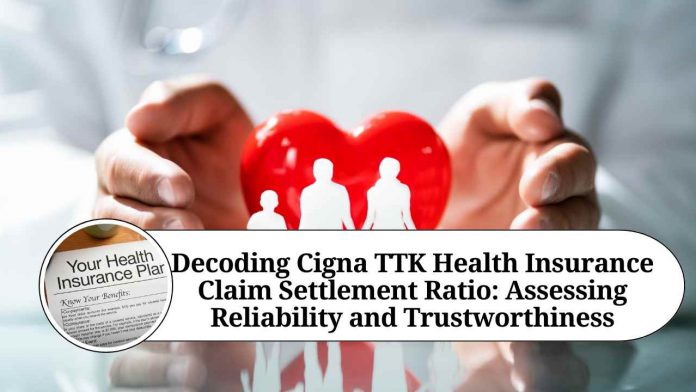Introduction:
In today’s uncertain times, having a reliable health insurance provider is essential for safeguarding oneself and loved ones against unforeseen medical expenses. One crucial factor to consider when choosing an insurance company is its claim settlement ratio. In this blog post, we will delve into the claim settlement ratio of Cigna TTK Health Insurance, a trusted name in the health insurance industry. We will explore what claim settlement ratio means, its significance, and why Cigna TTK’s ratio is an indicator of their reliability.
Understanding Claim Settlement Ratio:
Claim settlement ratio is a measure that indicates the percentage of insurance claims settled by an insurer in a given period. It showcases the company’s ability to honor policyholders’ claims and provide financial assistance when needed the most. A higher claim settlement ratio reflects the insurer’s reliability and commitment to fulfilling its obligations.
The Significance of Claim Settlement Ratio:
A high claim settlement ratio is crucial for policyholders as it instills confidence that their claims will be efficiently handled and settled without unnecessary delays or disputes. It gives assurance that the insurer has a strong financial standing, efficient processes, and a customer-centric approach. On the other hand, a low claim settlement ratio may indicate potential difficulties in claiming benefits when required.
Cigna TTK’s Impressive Claim Settlement Ratio:
Cigna TTK Health Insurance has established itself as a reputable player in the Indian health insurance market. Their claim settlement ratio is a testament to their commitment to policyholders’ well-being and financial security. Cigna TTK boasts an impressive claim settlement ratio, indicating their dedication to honoring claims promptly.
The high claim settlement ratio of Cigna TTK can be attributed to several factors:
- Robust Financial Strength: Cigna TTK’s strong financial position ensures that they have sufficient funds to meet claim obligations promptly.
- Efficient Claims Processing: The company employs streamlined and efficient claims processing mechanisms, minimizing delays and ensuring a smooth experience for policyholders.
- Transparent Policies: Cigna TTK emphasizes transparency in its policies, making it easier for policyholders to understand the terms and conditions related to claims. This approach reduces the chances of disputes and ensures smoother claim settlements.
- Customer-Centric Approach: Cigna TTK prioritizes customer satisfaction and focuses on delivering exceptional service. Their customer support team is well-equipped to handle queries and assist policyholders throughout the claims process.
Conclusion:
The claim settlement ratio is a vital metric for evaluating the reliability of a health insurance provider. Cigna TTK Health Insurance’s high claim settlement ratio is a testament to their commitment to policyholders and their ability to honor claims efficiently. With a robust financial standing, efficient claims processing, transparent policies, and a customer-centric approach, Cigna TTK provides policyholders with the peace of mind they need in times of medical emergencies. When considering health insurance, it is wise to take into account the claim settlement ratio, and Cigna TTK’s impressive ratio makes them a reliable choice for individuals and families seeking comprehensive health coverage.
Read more useful content:
Frequently Asked Questions (FAQs)
Q.What is a claim settlement ratio in health insurance?
A claim settlement ratio is the percentage of insurance claims settled by an insurer during a specific period. It reflects their ability to honor policyholders’ claims.
Q.Why is the claim settlement ratio important when choosing health insurance?
The claim settlement ratio is essential because it indicates how reliable an insurance company is in settling claims. A higher ratio implies a higher probability of seamless claim settlements.
Q.What is the claim settlement ratio of Cigna TTK Health Insurance?
Cigna TTK Health Insurance has an impressive claim settlement ratio, showcasing their commitment to settling claims efficiently. However, it is advisable to check the latest ratio from the company before making any decisions.
Q.Does a higher claim settlement ratio mean guaranteed claim settlement?
While a higher claim settlement ratio is a positive sign, it does not guarantee claim settlement in all cases. Other factors like policy terms, eligibility criteria, and documentation requirements also play a role.
Q.How can I check the claim settlement ratio of Cigna TTK Health Insurance?
You can visit Cigna TTK’s official website or contact their customer service to inquire about their claim settlement ratio. They should be able to provide you with the most up-to-date information.
Q.What should I do if my health insurance claim is denied?
If your claim is denied, you can contact Cigna TTK’s customer support to understand the reasons behind the denial. They can guide you on the next steps, such as filing an appeal or seeking clarification on the denial.
Q.Are there any common reasons for claim rejections?
Common reasons for claim rejections include policy exclusions, inadequate documentation, pre-existing conditions not disclosed, non-adherence to waiting periods, and claims filed for non-covered treatments.
Q.How long does it typically take for Cigna TTK to settle a health insurance claim?
The time taken to settle a claim can vary depending on various factors, such as the complexity of the case, availability of required documents, and the insurer’s internal processes. Cigna TTK strives to settle claims promptly, but specific timelines can be provided by their customer support team.
Q.Does Cigna TTK have a cashless claim facility?
Yes, Cigna TTK Health Insurance offers a cashless claim facility at their network hospitals. Policyholders can avail of medical treatments without paying upfront, subject to policy terms and conditions.
Q.Can I trust Cigna TTK Health Insurance based solely on their claim settlement ratio?
While a high claim settlement ratio is an important factor, it should not be the sole basis for trust. It is recommended to consider other aspects such as the company’s reputation, coverage options, customer reviews, and the overall customer service experience before making a decision.




















